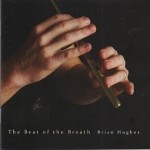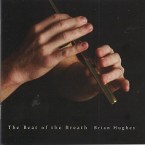Brian Hughes: The Beat of the Breath
Guest Musicians:
Donnachadh Gough: Bodhran
Garry O'Briain: Piano, Guitar, Mando Cello, Keyboards
Sean McElwain: Guitar & Bouzouki
David Day: African Drums, Bougarabou, & Dunun
The new album from tin-whistle virtuoso, Brian Hughes, who is widely considered as one of the best tin whistle players of his generation.
'The Beat of the Breath is that shiver in the heart of all of us — the over?owing of laughter,love and remembering ". John MacKenna.
.Also available from Copperplate Mail Order:
Brian Hughes: Whirlwind
Brian Hughes: This Day 20 Years
Audio
Top it off:
Ah Surely:
The Lady on the Island:
Track Listing
- Reels: The Maple Leaf/Bag of Spuds/The Primrose Lass.
- Slip Jigs: Boys of Ballisodare/Top It Off
- Jigs: Paidin O'Raifearta/Sliabh Russell
- HPs: The Plane of the Plank/The Pleasure of Hope
- Reels: The Roscommon Reel/Ah Surely.
- Slow Air: Taimse im Chodladh.
- Polkas: The Maid of Ardagh/Tuarmore/Manys A Wild Night.
- March & Jig: O'Sullivan's March/Coolinarne/Jackson's Morning Breeze.
- Reels: Caher Rua/Dan Breens/Now She's Purring
- Jigs: Happy to meet/Billy McCornack's/Troy's Wedding.
- Slow Air: Slan le Magh
- Reels: The Maids of Mount Cisco/The Lady on the Island.
- Slides: The Bicycle/Johnny O'Leary's/The Dirty Treetles
- Jigs: Tar Road to Sligo/Grainia's Welcome Home/The Drakes o f Kildare
The Beat of the Breath is Brian Hughes's second album on the Clo lar - Chonnacht label. The first, Whirlwind (CICD164), was released in 2006 to widespread critical acclaim and built on the early reputation that he garnered with his first album, Whistle Stop (CEFCDl78), released on the Gael Linn label.
As on Whirlwind, Brian Hughes is joined again by guest musicians, Donnchadh Gough (Danu) and Garry O Briain. New collaborators, the guest musicians, Sean McElwain (Teada) and David Day, join Brian on this latest album.
Brian Hughes is from Athy in County Kildare. His earliest introduction to music was through his grandfather, Christy Bracken, a noted bagpipe player, who passed his love of traditional music to his grandson. As well as the tin whistle, Brian also has a great interest in the flute and the uilleann pipes and was a regular visitor to the Pipers' Club on Henrietta Street, Dublin, in his youth. Brian has always been an avid collector of tunes, old and new .
'What you hold in your hand is the distillation of years and generations of writing, shaping, playing - creating. From the opening reels to the hop jigs, through the gorgeous slow airs 'Taimse im ' Chodladh and 'Slan le Maigh ', through slides and hornpipes and polkas to the closing notes of the jigs that end the collection, Brian plays with that amazing mixture of meticulous care and wild abandon... '— John MacKenna.
Press Reviews
The Living Tradition
Brian Hughes' debut album Whistle Stop announced the arrival of an accomplished new Irish music talent. While individualist whistle players like Mary Bergin, Sean Ryan and the late Donnchadh O'Briain had all made considerable marks with their debut releases, some attaining mythic proportions, new names were coming among them, like Brian Hughes. From Athy, Co. Kildare, he has made a name as a performer and music teacher frequently found in Summer Schools where he teaches the tin whistle. He has recorded three solo albums, of which The Beat Of The Breath is the most recent.
Initially his music had no lack of technical flair and ability but it failed to create a stylistic unity and individual identity. The good news is that two albums on, Brian Hughes' music emerges confident and personally stylistic. The fluency is still there but there is a sense of empowerment within the music previously unknown. The opening reels, The Maple Leaf , set forth with a tune composed by fellow whistler Darach De Brun and the tune's nuances roll in unison through a high speed work out. Slower paced slip jigs and hornpipes reveal a laid back gentleness with spacious breathy workouts that allow the tunes to reveal their essence. His jigs, Paidin O'Rafferty, find him creating an individual slant recalling some Mary Bergin and Sean Ryan references, but the bulk of the influence is his own. Slow airs like an epic Taimse Im Chodladh and Slan Le Maigh allow a pensive glance at the music's emotional power. There is a presence within his playing that signifies the blossoming and growth of a talent infrequently seen and less heard. With sparing accompaniments The Beat Of The Breath highlights the development inherent in Brian Hughes' music and is a seriously good collection. John O'Regan
R2 ****
Brian Hughes is readily acknowledged as one of the very best tin whistle players of his generation. This outing is his second album on the Clo lar-Chonnachta label, recorded in his hometown of Athy, Co. Kildare. Here he isjoined by multi-instrumentalist Garry O Briain, bodhran player Donnchadh Gough, percussionist David Day, and Sean McElwain on guitar and bouzouki.
As writer John MacKenna mentions in the extensive sleeve notes to this package, Hughes embraces influences flowing in from other musicians, mixing with his own family's musical heritage. On this CD they range from 'The Plane Of The Plank' written by Chicago-born fiddle player Liz Carroll, hornpipes and reels from Captain Francis O'Neill's Dance Music Oflreland and a slow airfrom John and William Neal's A Collection Of The Most Celebrated Irish Tunes of 1724.
The mixture of respective styles of the individual musicians on the album contributes to making this a ?ne selection of evocative and expertly played tunes by a real master of the art. Colin Bailey
The Irish Times
The Athy whistle player brings a largely unfussy clarity to his third solo album. Hughes's clean tone and keen rhythmic sensibility are at their best on the slip jig set, The Boys of Ballysadare , and the pair of jigs, Páidín Ó Raifearta/Sliabh Russell , with sympathetic and subtle accompaniment from Téada's Seán McElwain and Danú's bodhrán player Donnchadh Gough .
Hughes's Achilles heel is not as a player, but in his production of the pair of slow airs, Táimse im' Chodladh and Slán Le Máigh , which teeter towards the brink of being overwrought, and would most likely have benefitted from solo renditions. His inclusion of African drums on O'Sullivan's March brings a beautifully languid stillness to the mix. For whistle players and lovers of bare-boned tunes alike, this collection mines a rich seam, well worth exploring. Siobhan Long
Irish Music Magazine
Eileen McCabe talks whistles with Brian Hughes who has released a new album on the Cló Iar-Chonnacht label. This interview originally appeared in Irish Music Magazine , June 2013.
It's always heartening to discover someone with a genuine love for music and the tradition and when Brian Hughes talks tunes and whistles you detect a warmth and passion that enthuses throughout the conversation. The man, who is the musical heart of Athy, in County Kildare, digs deep into a tune and plays with the assuredness of a musician who is part of the whistle and the whistle is part of him. With the previously successful releases of Whistle Stop and Whirlwind, he is now completing the final touches to his latest album entitled The Beat of the Breath which will be released through the Cló Iar-Chonnacht label.
Music has always been a part of Hughes's upbringing, "I got the music from my mother's side of the family. I was encouraged at home by my parents and my Granddad, Christy Bracken, from a very young age. I don't remember not being able to play music; I started at school young and never left the whistle down. I was lucky that I never eally had to learn tunes; if I could hum it I could play it and it's still the same; I just listen to the tune once or twice and then play it. I feel I didn't get to choose the whistle as my main instrument, but instead it chose me. I never really had a chance from the word go I fell in love with the sound, the feel, the responsiveness of the instrument which allowed the tunes to be played with such intensity and speed, but still with a crispness and preciseness that other instruments don't achieve.
I was lucky in the fact that from a very young age I made an immediate connection with the slow airs which I loved to play so much. The whislte can be so full of loneliness, depth and sorrow, and I know that when I really immerse myself in an air, I live every note, every phrase, and every turn in the music and I am truly connected to a very deep and distant place."
The decision to create The Beat of the Breath was an easy one for Hughes. "I'm always collecting tunes and material and then trying to arrange the tunes in a slightly different manner to suit the whistle playing. I had a fair bit of decent material ready so decided to record. The name The Beat of the Breath came from an article written about my breath control on whistle. The writer felt that rather than interfere with the music, my breath sounds actually added to the rhythm and dynamics of the tune. It made me think for the first time about this aspect of any wind instrument, and so the name The Beat of the Breath suited the concept."
With beautiful slow airs such as Táimse im' Chodladh and Slán le Máigh available on the track listings as well as the faster paced polkas The Maids of Ardagh, Toormore and Many's a Wild Night; there's variety in abundance to listen to with the assistance of some noted guest musicians, which include Donnchadh Gough, Seán McElwain and Garry O'Briain. "The tracks seemed very suitable for Seán's style and Donnchadh lifts the tune on the bodhrán, whilst Garry O'Briain's influence was enormous," Hughes explains.
"Since my very first recording the musicians who played with me on this album are totally responsible for the really good vibe which was created in the studio, and theoverall sound which was produced. Musicians like these just amaze me over and over again with their musical ability. It is a fairly humbling experience to work with such brilliant people."
Brian certainly has consideration for the importance of passing on the music to the younger generation. A long time teacher of tunes, he expounds, "I genuinely feel that there is will be a load of young musicians waiting to communicate the music to the next generation, then the next and the next. The standard of the music is rising all the time. The kids now would frighten you with the ability that some of them have. I really feel that the music is safe in their hands." Eileen McCabe




